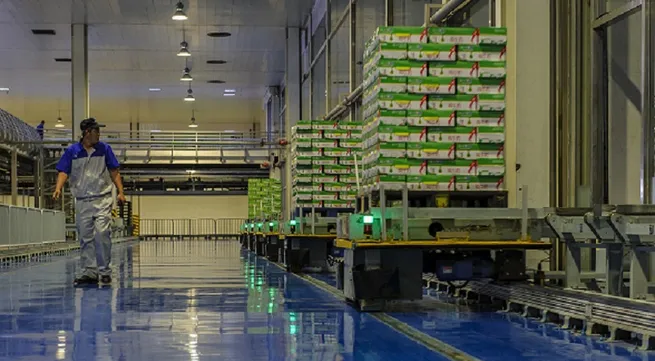Exports bounce back strongly thanks to global economy reopening

Since February of this year, the Vietnam-Taiwan joint venture between Huashen Garment and Textile Co., Ltd. based in the northern province of Hung Yen has been witnessing a 10% increase in export orders from the EU market, which accounted for 50% of its export revenue in 2020.
"We have been boosting exports to France, Belgium, Germany, and Spain where partners are recovering business and production. We have landed 10 orders from these partners. It is expected that our export value from these nations will increase by about 20% in the second half of this year," said Pham Phi Yen, vice sales manager from Huashen.
"Last year the company had to give layoffs to about 500 workers, or half of our total number of employees," Yen said.
In another case, since last December Hoang Ngoc Trading Co., Ltd. in Hanoi has also found it more favourable to speed up exports its agricultural products to the markets of Southeast Asia, the Republic of Korea, Japan, and Australia where demand has been recovering.
"Our export turnover has expanded by about 25% since December 2020, as we have been able to secure many orders from partners in these markets. Previously, they had to halt imports due to COVID-19, causing great difficulties to our company," said Nguyen Kim Hai, director of Hoang Ngoc Trading.
Surge in demands
Vietnam is an economy largely depending on exports and imports. Figures from Vietnam's General Statistics Office (GSO) showed that in 2020, while the GDP was valued at US$355 billion, total export-import turnover was US$544 billion, including US$281.5 billion from exports and US$262.4 billion from imports.
The nation's total export-import turnover is estimated to have hit US$262.21 billion in the first five months of 2021, including US$130.94 billion from exports - up 30.7% year-on-year, and US$131.31 billion from imports - up 36.4% year-on-year.
In the first four months of 2021, the economy's total export-import turnover is estimated to have hit US$206.51 billion, including US$103.9 billion from exports - up 28.3% on-year, and US$102.61 billion from imports - up 30.8% year-on-year.
When it comes to exports, Vietnam has seen a month-on-month rise in demands from many of its key export markets.
Specifically, in this period, the US was Vietnam's biggest export market, with total turnover of US$37.6 billion, up 49.8% as compared to that in the same last year. In the first four months, the figure was US$30.3 billion, up 50.1% year-on-year.
Meanwhile, China was Vietnam's second largest export market at US$20.1 billion, up 26% year-on-year (in the first four months the figure was US$16.8 billion, up 32.4% year-on-year), followed by the EU at US$16.1 billion, up 20.8%(in the first four months the figure was US$12.6 billion, up 18.1% year-on-year), Southeast Asia at US$11.5 billion, up 23.7% (in the first four months the figure stood at US$8.8 billion, up 13.3% year-on-year), the Republic of Korea at US$8.9 billion, up 17.1% (in the first four months the figure was US$6.9 billion, up 12.1 year-on-year), and Japan at US$8.4%, up 7.7% (in the first four months the figure sat at US$6.5 billion, up only 1.5% year-on-year).
All the statistics showed that the Vietnamese economy has witnessed a big rise in export turnover from April to May 2021.
"While the global economy is still being heavily affected by the COVID-19 pandemic, a shortage of empty containers, a climb in shipping charges and other transportation costs, Vietnam's export-import activities since early this year have been flourishing, with good growth in key exports such as electronics, garment, footwear, machinery and equipment, and farm produce in many markets, especially in the major markets such as the US, China, the EU, South Korea, Japan, and ASEAN," said Deputy Minister of Industry and Trade Cao Quoc Hung.
"It is forecast that Vietnam's export-import activities will continue to increase strongly in the time to come as free trade agreements (FTAs) involving the participation of Vietnam are carried out further. Especially, in addition to support packages launched by nations to support their citizens and businesses, agreements such as the Comprehensive and Progressive Agreement for Trans-Pacific Partnership (CPTPP), the EU-Vietnam FTA, and the UK-Vietnam FTA will facilitate Vietnamese products to penetrate into partner markets with preferential tariffs," Hung said.
Recovery on an uptrend
According to the Vietnamese Ministry of Industry and Trade, the global economy is recovering from a slowdown and has been adapting well to the new normal, with production and consumption rebounding thanks to many governments applying stimulus packages in favour of people and enterprises. This will also be favourable for Vietnam to boost exports.
Just one year after the onset of the coronavirus pandemic in the globe, the rapid pace of vaccinations and massive scale of fiscal stimulus spending will push the global economy including the American economy to recover strongly, the Organisation for Economic Co-operation and Development (OECD) said in its Economic Outlook, Interim Report titled "Strengthening the recovery: The need for speed" released a few weeks ago.
Global economic prospects have improved, with global GDP growth now projected to strengthen to 5.5% in 2021 and 4% in 2022, instead of -3.4% last year due to COVID-19, the OECD said.
Significant fiscal and monetary support continues to underpin activity. Additional discretionary fiscal measures announced in several countries in recent months will add to the overall support this year, including in the US, Japan, Germany, Canada, and India. Many countries have also extended existing income support schemes or planned for their reintroduction as in Brazil.
In Europe, spending of EUR2.018 trillion (US$2.45 trillion) from the Next Generation recovery fund is due to begin later this year, but the total discretionary fiscal stimulus in 2021 appears likely to be relatively mild, at around 1% of GDP in the euro area, despite considerable spare capacity.
Notably, the extent of fiscal support in the US this year is set to be considerably larger than in most other economies. The Consolidated Appropriations Act enacted last December contained new temporary measures worth US$900 billion (4% of GDP), largely concentrated on emergency assistance for households and the unemployed.
On March 12, US President Joe Biden signed the US$1.9 trillion American Rescue Plan Act into law, sending much-needed aid to millions of Americans still struggling from the COVID-19 pandemic.
The American Rescue Plan provides US$1,400 direct payments to individuals making up to US$75,000 annually, US$350 billion in aid to state and local governments and US$14 billion for vaccine distribution. The bill also provides US$130 billion to elementary, middle and high schools to assist with safe reopening.
The bill's economic-relief provisions are overwhelmingly geared toward low-income and middle-class Americans, who will benefit from (among other provisions) direct payments, the bill's expansion of low-income tax credits, child-care subsidies, expanded health-insurance access, extension of expanded unemployment benefits, food stamps, and rental assistance programmes. The bill contains little direct aid to high income-earners, who largely retained their jobs during the COVID-19 economic shock and bolstered their savings.
As for Vietnam-based companies like Huashen Garment and Textile Co., Ltd, they are expecting to benefit further from exports.
"The prices of exported products in general have begun to increase, and we believe that we will be able to secure more export contracts with more European partners from now until the year's end," said Pham Phi Yen, vice sales manager from Huashen.
Meanwhile, Adam Sitkoff, executive director of the American Chamber of Commerce (AmCham) in Hanoi, suggested that it is important for Vietnam to recognise that in-bound travel brings in the foreign experts and businesspeople necessary to facilitate new investment, efficient operations, key infrastructure, education of Vietnamese children and more.
"About 81% of AmCham members say their company would bring more people to Vietnam if the mandatory quarantine period was reduced from 21 days down to seven days," Sitkoff said. "The pandemic is likely to continue causing disruption and locking people inside a room for many weeks might seem like a good idea today, but Vietnamese policymakers need to think seriously about a safe and simple system of documentation that will facilitate international arrivals here."
Tags:





